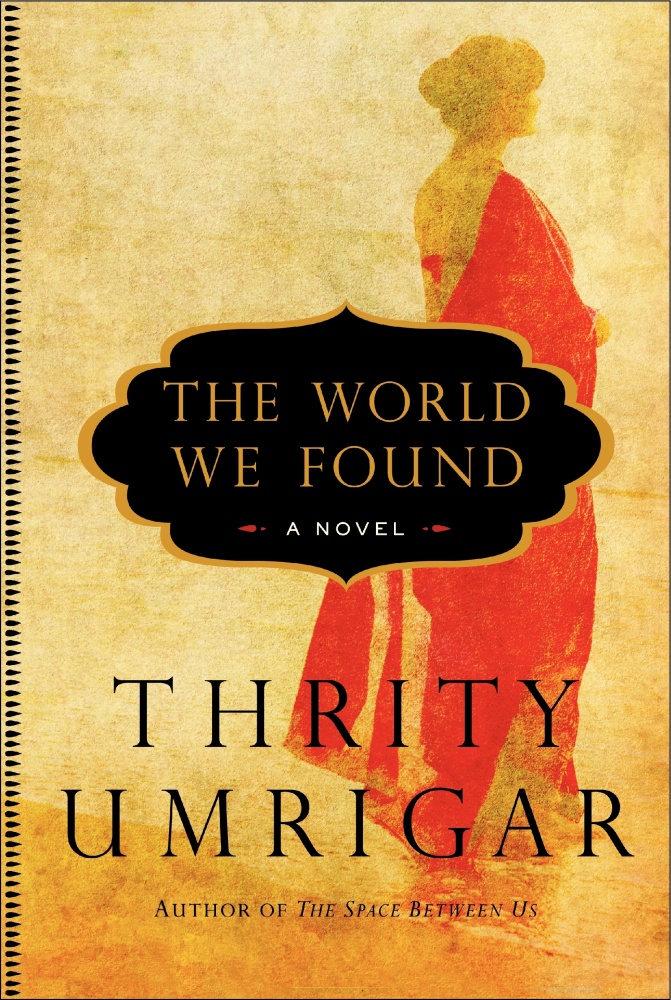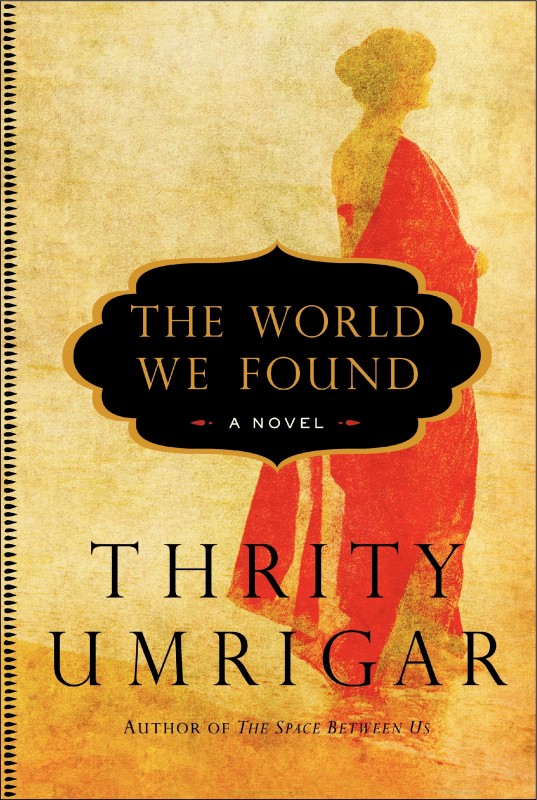03 Jan / The World We Found by Thrity Umrigar + Author Interview [in Bookslut]

 Here’s a moment of literary serendipity: on the morning my Bookslut interview with Luis Alberto Urrea went up, I happened to be finishing the galley of Thrity Umrigar’s latest novel, The World We Found. Amazingly, here’s what appears in the penultimate paragraph on the very last page: “Thanks to Luis Alberto Urrea, whose definition of ‘the trembling ones,’ inspires my work.” What are the chances?
Here’s a moment of literary serendipity: on the morning my Bookslut interview with Luis Alberto Urrea went up, I happened to be finishing the galley of Thrity Umrigar’s latest novel, The World We Found. Amazingly, here’s what appears in the penultimate paragraph on the very last page: “Thanks to Luis Alberto Urrea, whose definition of ‘the trembling ones,’ inspires my work.” What are the chances?
When I contacted Umrigar to set up our interview for this piece, she mentioned that she had just started Urrea’s Into the Beautiful North: “Howz that 4 coincidence?” she immediately replied. After a little nagging, she explained her “trembling” reference: “I heard Luis tell a story about his dad working as a janitor in a nearby bowling alley. And Luis was there with his friend but he didn’t acknowledge his dad. The friend didn’t know their relation and made fun of the ‘janitor’ and the father just stood there, mute, trembling with embarrassment. And Luis said something like, ‘here’s to the trembling ones.’ And I thought to myself that that was the best damn description of who I write for and why I write, that I’d ever heard. He’s so friggin’ brilliant, isn’t he?”
I, too, eventually recognized this story because I realized I was actually there: I moderated a panel almost a year ago at the 2011 AWP Conference, where I introduced Urrea and recognized Umrigar in the audience. Umrigar would, of course, become the best part of the post-presentation discussion that followed. She is, in live time, fiery, inquisitive, challenging … though occasionally she’ll give your brain a rest with her own brand of goofy fun.
On the page, Umrigar is equally fiery and challenging, although she is capable of wielding powerful control even while revealing the most wrenching moments in her resonating novels: dissolution of decades-long relationships in her debut Bombay Time (2001), utter betrayal in The Space Between Us (2006), the death of a beloved spouse and sudden uprooting in If Today Be Sweet (2007), and the unthinkable loss of a child in The Weight of Heaven (2009).
Readers of The World We Found are surely in for some “trembling” of their own. What might initially read like chick lit – four college friends are brought back together after almost 30 years of drifting apart to fulfill the dying wish of one of their own – evolves into an explosive, revelatory examination of class, gender, family … and the very extremes of religion.
Not yet 50, Armaiti is dying of a virulent brain tumor, and having seen her own mother suffer a horrible death, she decides she will hold on as long as she can to her quality of life and not be controlled by debilitating medical interventions. More than anything, Armaiti wants to reunite with the vibrant soulmates of her youth, her three closest friends who remained in Bombay. As university students together back in the 1970s, the fearless four were idealistic, devoted, ready to fight any and all injustice. Decades later, Laleh is a privileged wife and mother, Kavita is an accomplished in-demand international architect, and Nishta has all but disappeared. With the help of Laleh’s Mr. Fix-It-husband and in spite of the obstacles of Nishta’s fundamentalist spouse, Armaiti must get her final wish.
You’ve got some explosive content in this, your latest. No spoilers here, but that final scene in the airport is a shocker. Are you ready for the reactions you’re definitely going to get?
I’m not sure what you mean. Why is the scene a shocker? I mean, I understand that it’s meant to be a surprising twist – that was my intention – but I’m not trying to offend or insult any group. My main contention is that when individuals have power over others, more likely than not they will use, and abuse, that power. What reactions, and from whom, do you think I’ll get?
That was actually one of the details about this book that I admired most, that none of the characters were ever simply “good” or “bad,” and that even the “good” guys were not above falling prey to abusing their power. But back to that final scene, I don’t at all think you were intending to offend or insult any group! I’m convinced, though, that you’ll have readers who will have strong reactions to Adish’s inflammatory one-word solution to the situation at hand. Adish has been a calming, reassuring presence throughout most of the book, so it’s a shocker when he reacts as he does at the airport. Post-9/11, don’t you feel people have become hyperaware, even hypersensitive to certain trigger words and situations?
That’s great; I want them to have a strong reaction to his “one-word solution,” as you so delicately put it. My hope is that they will ask themselves what they would’ve done in this situation and whether the ends can ever justify the means.
Let’s back up a little: So when did you begin writing World? How did the story come to you?
The bare outlines of the story took shape after a chance meeting in India with a college friend I hadn’t seen in over 25 years. We were catching up on our lives and she mentioned that she had moved away from the activism of her college days after the Hindu-Muslim riots that tore apart Bombay in 1992-’93. It marked the end of her innocence, in a way. And although I was living in the U.S. by then, I remembered how the riots had affected me at a very deep level. It was almost as if the secular, easy-going, tolerant city we had grown up in, didn’t exist any more. So I could relate to her feelings, even though I disagreed with her conclusions. And then I asked myself questions about lost idealism and whether something of value still lingered from that era. And slowly, the book took shape. [… click here for more]
Author interview: Feature: “An Interview with Thrity Umrigar,” Bookslut.com, January 2012
Readers: Adult
Published: 2012
